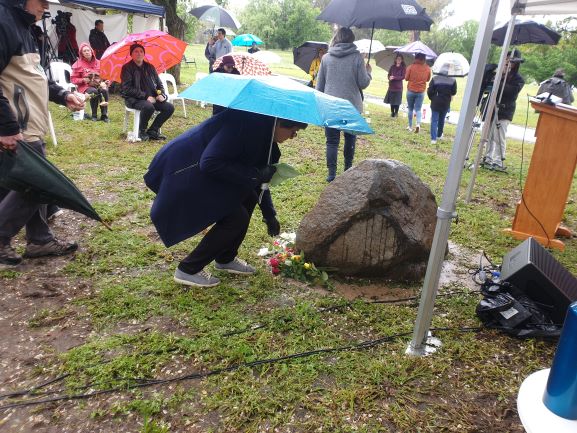One day a year for 25 years, the loved ones of those who have lost their lives to illicit drugs have gathered at a memorial rock in Weston Park in remembrance and grief.
During this year’s ceremony, held yesterday (26 October) by Families and Friends for Drug Law Reform (FFDLR), the crowd stood silently, in solidarity with each other, as hundreds of names of the dead were read aloud.
FFDLR president, Bill Bush, acknowledged the traditional owners of the land, before reciting a conversation with Indigenous Elder Doug Walker at a FFDLR national meeting in 2000.
“Doug likened the impact of drugs on his people to a desert oak stripped of leaves and branches,” Mr Bush said.
“He told me that while they were still grieving for one death, they would hear of another.
“A community of suffering binds us all.
“The drug policies we want changed would go a long way towards closing the gap that shames our nation.”
Mr Bush said his organisation would continue to work to decriminalise personal use and possession and to boost harm minimisation strategies.
Canberra has some of the most relaxed drug laws in the country, including pill testing at festivals, but Mr Bush said they would not be satisfied until names stopped being added to the list.
Teenagers Julian Juhas and Oscar Wilson should have been stressing about their upcoming exams, but instead, they were at the ceremony honouring their late friend, Matt.
Popular CIT student Matthew Lloyd was described as a music lover, illustrator, video editor and comedian; he died from an overdose of multiple drugs including Xanax, earlier this year.
Matt’s friends described him as friendly and outgoing and said his personality hid his poor mental health.
They said Matt’s insomnia and anxiety drove his struggle and, as his challenges grew, so too did his drug use.
Julian said Matt died during a period where he was not in contact with anyone and reflected upon what could have been done differently.
“What if I had have checked on him on person?” Julian asked.
Oscar said mental health services need to do more to protect young generations.
“No one should be treated like a criminal by health services. There needs to be safe, effective, and accessible solutions for young people,” Oscar said.
Nineteen-year-old Alexandra Ross-King, from the Central Coast, was one of five young people to die of an overdose at music festivals in New South Wales in 2019.
Her mum Jennie Ross-King spoke about the devastation caused by her death.
She urged the crowd to make room in conversations for grieving parents to talk about their lost babies.
Jennie said Alexandra was a happy 19-year-old, with plans to explore the world, restore her Volkswagen, and without any idea what she wanted to do with her life.
She said their family had faced the normal ups and downs of life, and it was Alexandra’s pushing of boundaries and experimenting that led to her death.
She said her daughter’s death was preventable and urged politicians forget their “moral and political” opposition to drug reform and instead listen.



